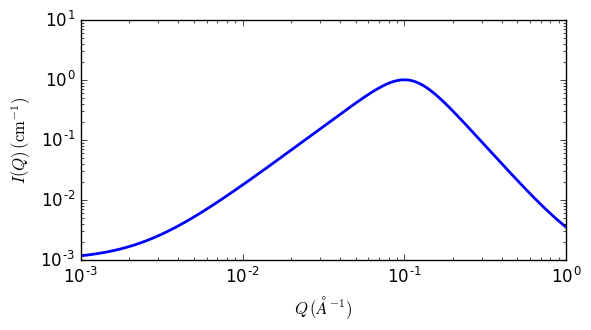spinodal
Spinodal decomposition model
| Parameter | Description | Units | Default value |
|---|---|---|---|
| scale | Source intensity | None | 1 |
| background | Source background | cm-1 | 0.001 |
| gamma | Exponent | None | 3 |
| q_0 | Correlation peak position | Å-1 | 0.1 |
The returned value is scaled to units of cm-1 sr-1, absolute scale.
Definition
This model calculates the SAS signal of a phase separating system undergoing spinodal decomposition. The scattering intensity \(I(q)\) is calculated as
where \(x=q/q_0\), \(q_0\) is the peak position, \(I_{max}\) is the intensity at \(q_0\) (parameterised as the \(scale\) parameter), and \(B\) is a flat background. The spinodal wavelength is given by \(2\pi/q_0\).
The exponent \(\gamma\) is equal to \(d+1\) for off-critical concentration mixtures (smooth interfaces) and \(2d\) for critical concentration mixtures (entangled interfaces), where \(d\) is the dimensionality (ie, 1, 2, 3) of the system. Thus 2 <= \(\gamma\) <= 6. A transition from \(\gamma=d+1\) to \(\gamma=2d\) is expected near the percolation threshold.
As this function tends to zero as \(q\) tends to zero, in practice it may be necessary to combine it with another function describing the low-angle scattering, or to simply omit the low-angle scattering from the fit.

Fig. 116 1D plot corresponding to the default parameters of the model.
References
H. Furukawa. Dynamics-scaling theory for phase-separating unmixing mixtures: Growth rates of droplets and scaling properties of autocorrelation functions. Physica A 123,497 (1984).
Revision History
- Author: Dirk Honecker Date: Oct 7, 2016
- Revised: Steve King Date: Sep 7, 2018